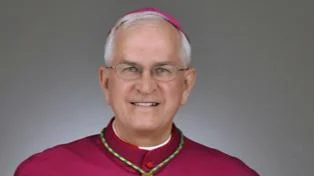
Reverend Joseph E. Kurtz, D.D. Bishop | Archdiocese of Louisville
PAYNEVILLE, Ky. — More than 150 years ago, those who built St. Mary Magdalen of Pazzi Church—a modest-sized red-brick building located on state highway 376 in Meade County—must have felt as unprepared to build a church as the disciples did on that first Pentecost, said Archbishop Shelton J. Fabre. He celebrated a special anniversary liturgy on May 18, the eve of Pentecost, at the parish in Payneville, Ky., marking a celebration delayed by the pandemic.
St. Mary Magdalen of Pazzi reached its 150th milestone in 2022 amid COVID-19. During his homily, the archbishop asked members of the congregation to place themselves in the Upper Room on the day of Pentecost. The disciples huddled with the Blessed Virgin Mary must have been afraid and wondering how they’d fulfill the mission Jesus left them; they could have easily given up, the archbishop said.
“Your ancestors knew that same feeling when they decided, with the help of the Holy Spirit, to establish this parish church, breaking off from St. Theresa and calling this their spiritual home,” he said.
St. Mary Magdalen of Pazzi parish was established in 1872 and a wood frame building was constructed that year on two acres of land purchased for $30 in 1871. The church grew out of St. Theresa Church in Rhodelia, Ky., and Holy Guardian Angel Church in Mount Merino, Ky. Father Jule Pierre Roaux, St. Theresa’s pastor newly arrived from France, was charged with developing the new parish.
The parish has approximately 500 parishioners, many of whom are related, and some have been members for more than seven decades.
Margaret Mullins, a parishioner, said the 150th anniversary is an occasion for her to reflect on the fact that she’s “half as old as the church.” Mullins lives across the street from the church and has walked to Mass all her life. The family feel of the parish has kept her a faithful member.
“Everybody’s kin to everybody,” she noted during an interview before the liturgy.
Archbishop Fabre told the congregation that sin often causes individuals to fall short of what Christ calls them to do. The truth remains that nothing can “disqualify” anyone from doing what God wants: for each person to do their best.
“God is not asking us to be perfect. God is not asking us to do the impossible. God is asking us to do what we can,” he said. “That is what your ancestors in faith realized when they established this parish—that if they did their best at what they felt God was calling them to do—God would take care of the rest.”
The original wooden church built by those ancestors became a spiritual home and stood for more than six decades until it was destroyed by fire in March 1936. Over the next year determined parishioners built a brick structure which was blessed by Bishop John A. Floersh in March 1937.
Among those who attended were Margaret Mullins’ cousins Peggy Pollack Greenwell and Linda Greenwell along with her husband Robert Greenwell—all members for more than 70 years.
As lifelong parishioners they are guardians of many memories and stories about growing up at St. Mary Magdalen during times when people spent all day at church on Sunday according to Pollack Greenwell who shared stories passed down from her mother-in-law about traveling by horse and wagon with heated bricks placed inside wagons to keep children’s feet warm while attending services.
Leon Pike also attended; at age 68 he too is a lifelong member noting "faith and family" have kept him there all these years citing seven families including Hardestys Facklers Greenwells Mattinglys Pikes Barrs Clarks who have been part since generations past maintaining community mainstay status exemplified by annual picnics dating back since 1932 drawing diverse attendees while outreach efforts extend beyond such events providing Thanksgiving Christmas food baskets poinsettias shut-ins further illustrating inclusive spirit remarked Pike concluding sentiments echoed Archbishop underscoring apostles’ movement fueled similarly founders driven Holy Spirit power grace realizing collective wonderful outcomes




 Alerts Sign-up
Alerts Sign-up